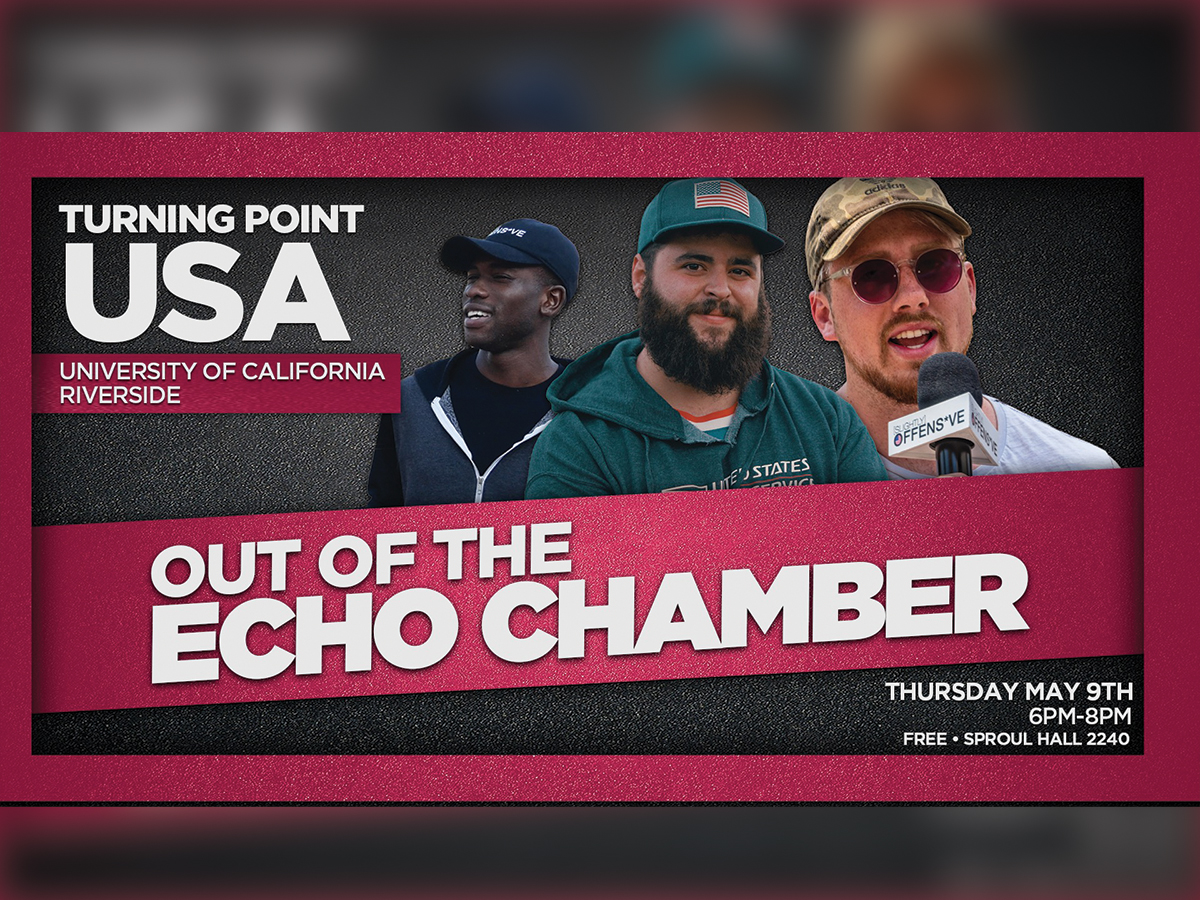
About 60 people crammed into Sproul 2240 on Thursday, May 9 to hear a panel of right-leaning social media influencers speak on the diffusion of ideas and freedom of speech on American college campuses. Desks held various posters for attendees, proclaiming “Redistribution of wealth is theft” and “Opportunity for all,” as well as buttons and stickers.
Held by the UC Riverside chapter of Turning Point USA (TPUSA), a national conservative student organization, the event was titled “Out of the Echo Chamber” and served to diversify ideas on college campuses, which organizers of the event consider a place where students are “indoctrinated with leftist ideology,” according to an email to the Highlander.
The panel began around 6:30 p.m. and consisted of Mike Ayetiwa, also known as “The Black Mic,” Elijah Shaffer or “Slightly Offens*ve,” and Austen Fletcher, known by his channel “Fleccas Talks” and was moderated by TPUSA Riverside Campus Coordinator and President Navneel Sekhon. The panel’s responses to questions posed by Sekhon was followed by a 30-minute Q&A. Primarily, the speakers called for open dialogue on college campuses to promote diverse opinions.
The first question posited when and why universities have become an echo chamber for liberal and left-leaning ideology. Ayetiwa explained that it began with professors who teach that white people are evil. He used an example from when Will Witt, another conservative social media commentator, and himself were chased off of campus by a professor after she spotted them dressed as a pilgrim and Native American.
“There were some other indigenous girls that were also upset,” Ayetiwa explained, stating they were having a respectful conversation when the situation escalated because “the teacher came into the scene.” Ayetiwa faulted professors for the echo chamber stating, “students aren’t walking in raging liberals, they’re walking out raging liberals.”
Separately, Ayetiwa explained that leftists have “infiltrated” school curriculums and that left-leaning ideologies are so prevalent in university settings because there has “been decades of unchallenged ideologies.” Ayetiwa thanked Donald Trump’s election for making the “silent majority not so silent anymore,” using a term popularized by Richard Nixon in a 1969 speech. He encouraged students to challenge professors, open a dialogue and have debates. “If we’re not having dialogue and having debates, which is the whole point of university … then more likely than not you just come out of the university as a raging liberal,” stated Ayetiwa.
In a second question concerning whether universities have an inherent bias toward left-leaning ideology, Schaffer drew on the political climate in Canada to illustrate how modern culture has frightened him, stating “this is where we (the United States) might be headed in the next 10 years.” Schaffer took issue with Canadian Prime Minister Justin Trudeaux’s remarks calling mankind “peoplekind” instead. Schaffer stressed the importance of words. “There are people who realize that language controls the direction of a population,” stated Shaffer, “those who control the words control the country.” Schaffer explained that “radical progressives” realized “the best way to socially reengineer a country … or an entire Western culture in general is to hit the kids in the classroom.”
Schaffer went on to assure the crowd during an answer for a separate question that conservatives are much more numerous in the United States than many think. He said that a “loud minority,” referring to those on the radical left, receive more airtime than politically moderate people. “We aren’t as outnumbered as we’re made to be,” he said. Schaffer explained that right-leaning people care more about diversity of opinions rather than physical appearance, stating “the left is going out there and preaching a message, ‘everyone’s a little different, come join us and become the exact same.’”
Sekhon asked Fletcher how students can start the conversation on college campuses. “I created my channel basically so people realize they shouldn’t fear the mob,” Fletcher said, “We’ve been forfeiting the narrative for all these years.” Fletcher encouraged students to meet in the middle and be sympathetic, stressing the interpersonal connections that matter the most. He explained that the echo chamber in academia has prevented conservative ideas from being heard on an equal playing field. He encouraged students to engage their politically apathetic friends and address “the lies that have been spoken about Trump, Republicans and yourselves.”
Fletcher went on to draw on his own personal experience; he previously identified as a Democrat, attributing this to being “unaware of what was going on.” Once he realized what he perceived as lies in the mainstream media and watched documentaries by Dinesh D’Souza, his perspective deeply changed. “That red pill feeling, that rabbithole that you go down, it’s hard to get out of that,” he said. Fletcher encouraged the audience to share clips from their favorite commentators that emphasize free speech to grow the base.
Responding to a question that asked when left-leaning ideology became so prominent in universities, Fletcher identified a binary dynamic in left-leaning orthodoxy explaining “the left’s hierarchy isn’t based on confidence or intelligence, it’s actually based on victimhood … with that, it’s created two sides where you’re either a victim or an oppressor.” Fletcher elaborated stating, “At the end of the day, we’re based in truth … they can’t beat the truth.” He then proceeded to identify several resources such as Turning Point and PragerU, stating that students can now report professors for, in his view, retaliating against students with right-leaning opinions.
Afterward, the Highlander spoke with Sekhon, a second-year mathematics major, about the event, where she expressed her desire to open up a discussion on campus. “We love for people to come … we love diverse ideas,” Sekhon said, “we don’t want people to perceive us as a threat, we’re just very civil and want to have a discussion.” Sekhon did praise her professors for being more open-minded regarding her views in class essays. She explained that the best way to break up the echo chamber is to pose new ideas and bring people who may have different opinions to their events. She stressed the importance of “having a more open mind … and not being so focused on what you heard from your professor.”
One attendee, Farzaneh Talebi Liasi, a first-year biology major, who identifies as a political moderate, said that coming to panels like this event is important to “encourage dialogue otherwise you can’t see the other side,” Talebi Liasi said. She continued saying “in order to think introspectively, we as people have to understand the nuances of our own arguments and once we don’t see that we become hypocritical if we can’t see things in a holistic manner.” Talebi Liasi called for more panels that represent “both sides of the aisle” and promote respectful dialogue.
This event is TPUSA’s first event at UCR. Sekhon informed the Highlander that they will be having more events starting in the 2019-20 academic year.







